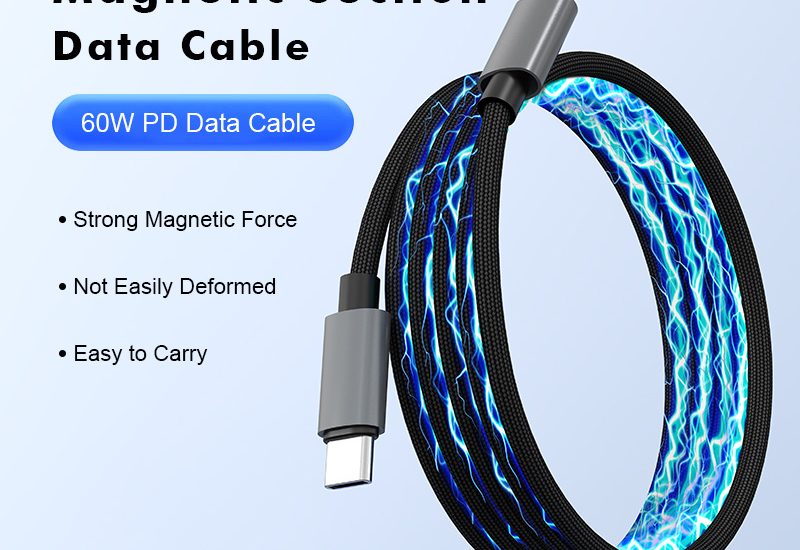As the tech world continues to evolve, USB-C has become the go-to standard for charging and data transfer across a variety of devices. From smartphones and tablets to laptops and gaming consoles, the USB-C port is versatile, fast, and universally compatible. In this blog, we’ll explore three essential types of USB-C cables: USB-C to USB-C cables, C to C USB cables, and Magnetic USB-C cables. Understanding the differences and best use cases for each can help you choose the right cable for your needs.

USB-C to USB-C Cables: The Standard for Modern Devices
USB-C to USB-C cable are the most common type of USB-C cable, featuring USB-C connectors on both ends. These cables are ideal for:
Charging: Whether you’re powering up your smartphone, tablet, or laptop, USB C to USB C cable provide fast and efficient charging. Many of these cables support Power Delivery (PD), which allows for higher wattage and faster charging speeds—especially important for devices like laptops that require more power.
Data Transfer: USB-C to USB-C cables are not just for charging; they also offer high-speed data transfer capabilities. With support for USB 3.1 or higher, these cables can transfer data at speeds up to 10Gbps, making them perfect for transferring large files, photos, or videos between devices.
Video Output: Many USB-C to USB-C cables also support video output, enabling you to connect your device to a monitor or display. This is particularly useful for laptops and tablets, allowing for easy setup of dual-screen workstations.
When choosing a USB-C to USB-C cable, it’s important to consider the cable’s power delivery and data transfer capabilities. Look for cables that are USB-IF certified to ensure compatibility and safety with your devices.
C to C USB Cable: A Versatile Choice for Multiple Devices
While C to C USB cables are essentially the same as USB-C to USB-C cables, the term is often used interchangeably to emphasize the universal compatibility of USB-C. These cables are compatible with a wide range of devices, including:
Smartphones: Most modern Android smartphones now come with USB-C ports, making C to C USB cables a great choice for charging and syncing. They are often bundled with new phones, but it’s always good to have a spare for the car, office, or travel.
Laptops and Tablets: Many of the latest laptops and tablets feature USB-C ports for charging and data transfer. A C to C USB cable can be used to connect your device to chargers, power banks, or other USB-C equipped accessories like external hard drives.
Gaming Consoles: Devices like the Nintendo Switch also utilize USB-C for charging and data transfer, making C to C USB cables a versatile option for gamers on the go.
When purchasing a C to C USB cable, ensure it supports the necessary power and data requirements of your devices. For instance, a cable for a laptop should support higher wattage, whereas a cable for a smartphone may not need such high specs.
Magnetic USB C Cable: Convenience and Safety Combined
Magnetic USB-C cables offer a unique twist on the traditional USB-C connection. These cables feature a detachable magnetic connector that snaps onto the cable when brought close, offering several advantages:
Convenience: Magnetic cables are incredibly easy to connect and disconnect, especially in dark or hard-to-reach places. They eliminate the need to align the connector perfectly, making charging simpler and faster.
Safety: One of the biggest benefits of magnetic cables is their safety feature. If someone trips over the cable, the magnetic connection will safely detach without pulling your device to the ground. This is particularly useful for laptops and other larger devices.
Port Protection: Frequent plugging and unplugging can wear out your device’s USB-C port over time. Magnetic USB-C cables help protect the port from damage by reducing the wear and tear associated with constant use.
When choosing a magnetic USB-C cable, look for a strong magnet to ensure a secure connection. Also, consider the power and data capabilities to match your specific needs, as not all magnetic cables are created equal.
Conclusion
Whether you’re looking for a USB-C to USB-C cable, a C to C USB cable, or the convenience of a Magnetic USB-C cable, understanding the features and benefits of each type can help you make an informed decision. From fast charging and high-speed data transfer to enhanced safety and convenience, the right USB-C cable can greatly enhance your tech experience. Always check the specifications and certifications to ensure compatibility with your devices, and enjoy the seamless connectivity that USB-C technology has to offer.